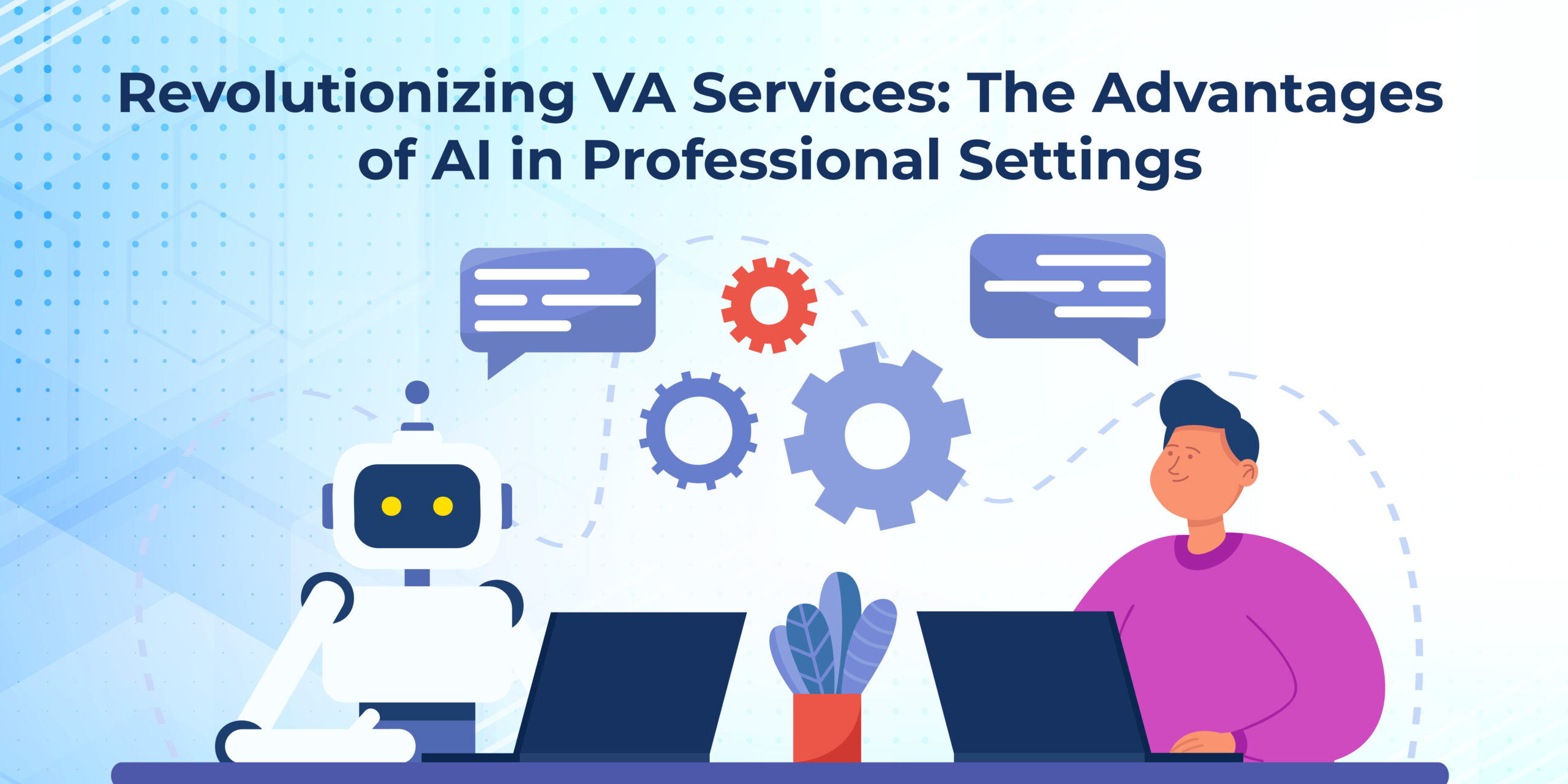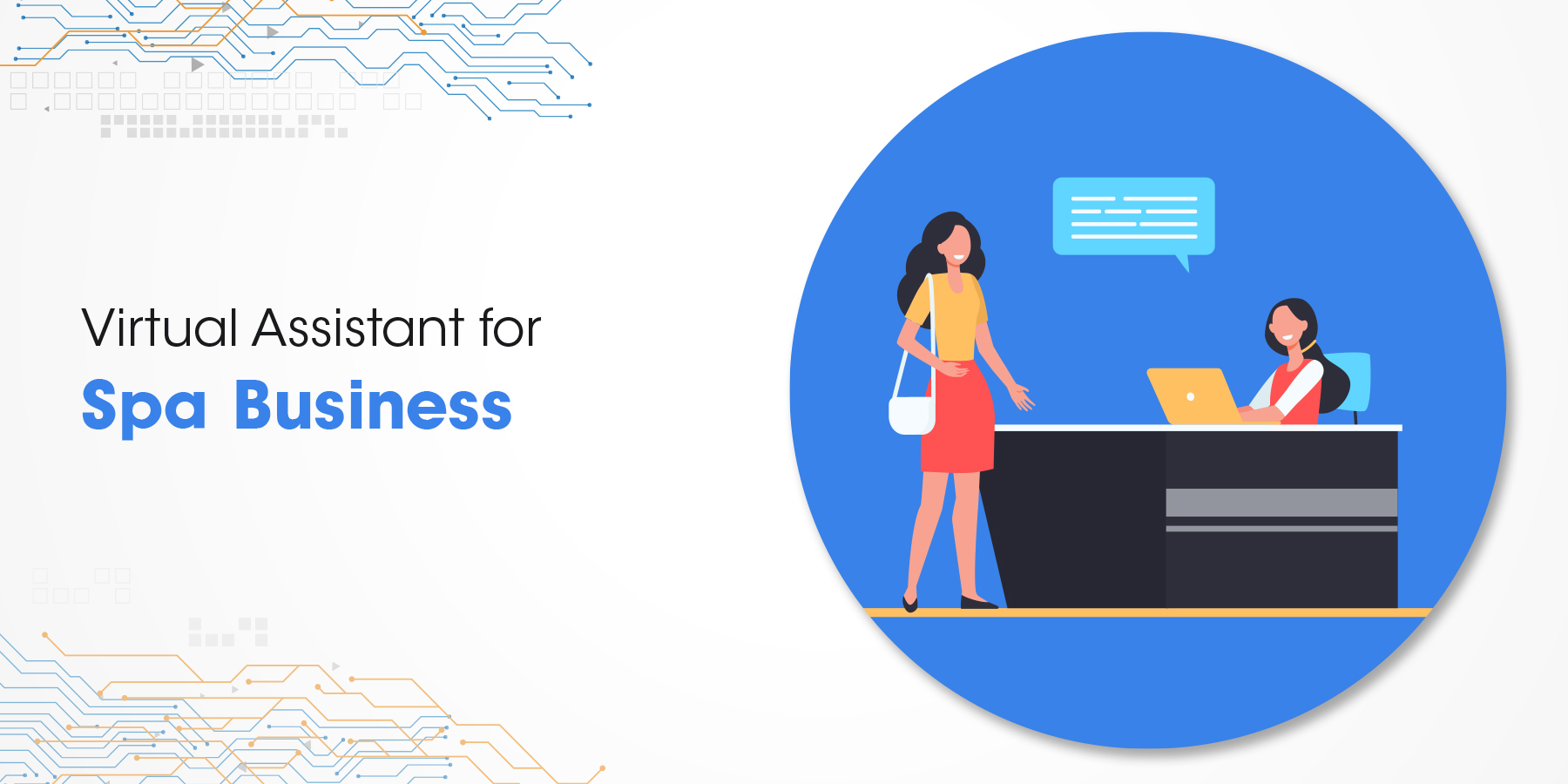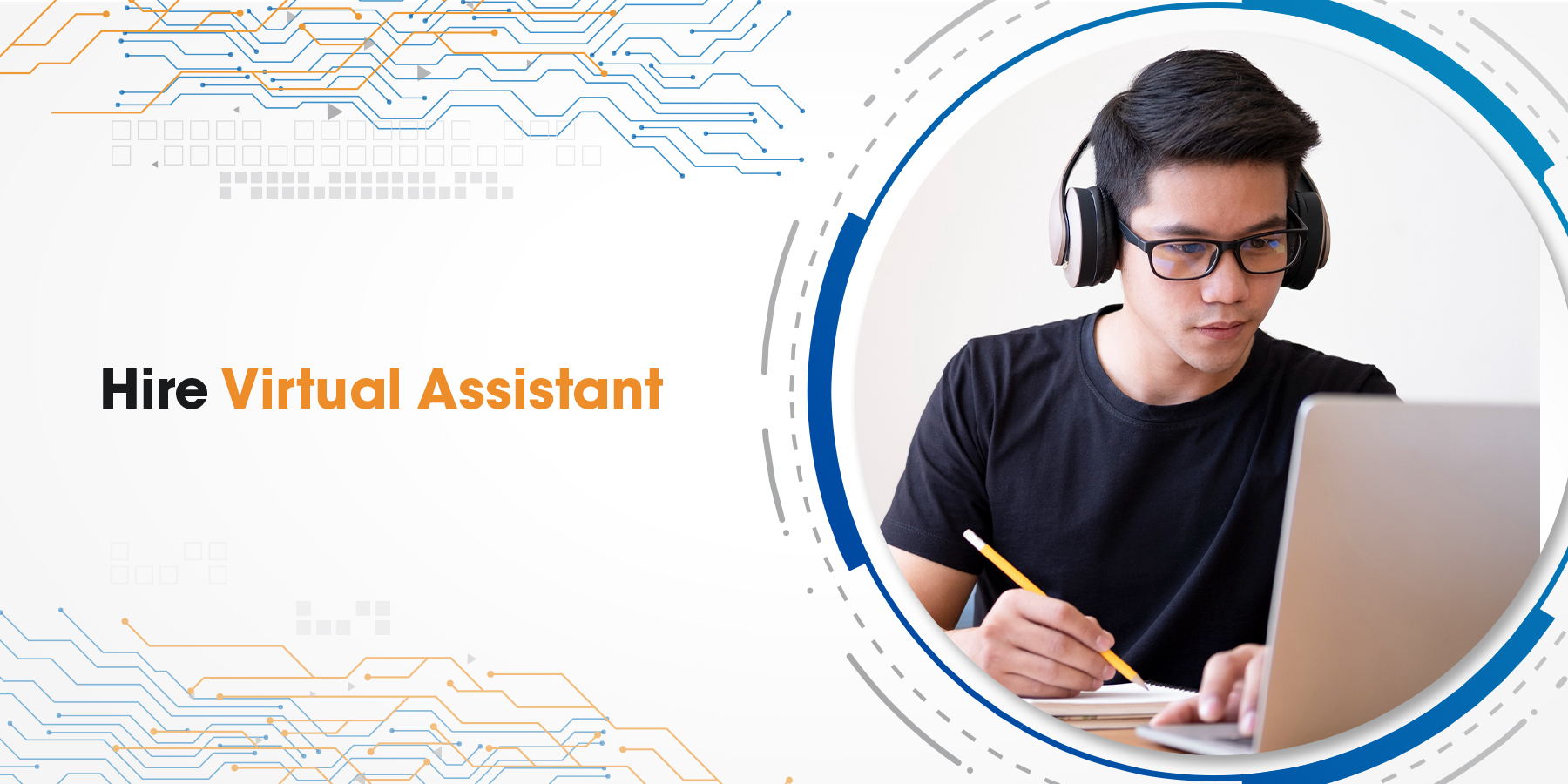Home / Blog / Revolutionizing Virtual Assistance Services: The Advantages of Artificial Intelligence in Professional Settings
Revolutionizing Virtual Assistance Services: The Advantages of Artificial Intelligence in Professional Settings
Artificial Intelligence (AI) has become increasingly prevalent in various industries and is transforming how we work and interact with technology. According to IBM, 35% of companies utilize AI, while 42% of companies are considering implementing AI in the future. One area where AI significantly impacts is professional virtual assistant services. From personal assistants like Siri and Alexa to virtual assistants in the business world, AI is changing how we approach tasks, manage our time, and streamline our work processes.
In this blog post, we will explore how AI is helping professional virtual assistants, the benefits it brings, and the challenges it poses. We will also examine how AI is transforming the role of virtual assistants and what the future may hold for this growing field.
How AI Works in Virtual Assistance Services?
Artificial Intelligence (AI) is a rapidly advancing field involving intelligent machines to perform tasks that typically require human intelligence. In professional virtual assistant services, AI technology automates routine tasks, understands and responds to natural language, and personalizes support. Here are some key points on how AI works in professional virtual assistant services:
1. Machine Learning
One of the key areas of AI technology used in virtual assistant outsourcing services is machine learning. Machine learning involves training machines to recognize patterns in data and make predictions based on those patterns. In virtual assistance services, this can be used to analyze data on a user’s behavior and preferences and then use that data to make personalized recommendations.
A virtual assistant service that uses machine learning is Amazon’s Alexa. Alexa uses machine learning algorithms to analyze a user’s behavior and preferences and provide personalized recommendations based on that data. For example, if a user frequently orders pizza on Friday nights, Alexa may suggest a pizza delivery service on Friday evenings. Over time, Alexa’s machine learning algorithms improve as they gather more data on a user’s behavior and preferences, resulting in more accurate and relevant recommendations.
2. Natural Language Processing (NLP)
Another important area of AI technology in virtual assistant outsourcing services is NLP. NLP involves the ability of machines to understand and respond to natural language. This includes recognizing speech patterns, interpreting meaning, and generating appropriate responses. NLP technology is constantly evolving, and advances in machine learning are becoming increasingly accurate and efficient.
An example of a virtual assistant service that uses NLP is Apple’s Siri. Siri uses NLP to understand and respond to a user’s voice commands and questions. Users can ask Siri to set reminders, make calls, send messages, and search the internet using natural language. Siri’s NLP technology allows it to understand the meaning behind a user’s words and generate appropriate responses. As NLP technology continues to advance, Siri’s ability to understand and respond to natural language commands will only become more sophisticated and efficient.
3. Personalization
AI technology is also used to personalize virtual assistant outsourcing services based on a user’s individual needs and preferences. For example, virtual assistants can learn from past interactions to make personalized recommendations or to provide more efficient and effective support.
One example of a virtual assistant service that uses personalization is Google Assistant. Google Assistant can learn from a user’s interactions to provide more personalized recommendations and support. For example, suppose a user frequently searches for information about a particular topic or location. In that case, Google Assistant may proactively provide information or recommendations related to that topic or location in the future.
Additionally, Google Assistant can be customized with user-specific preferences and settings, such as preferred language and music streaming services, to provide a personalized experience for each user.
4. Automation
One of the primary benefits of AI in virtual assistance services is automation. AI-powered tools can handle routine tasks, such as scheduling appointments or sending reminders, without human intervention. This frees up time for more strategic tasks, improving efficiency and productivity.
One example of a virtual assistant service that uses automation is X.ai. X.ai is an AI-powered scheduling assistant that can handle the scheduling of meetings and appointments. X.ai can analyze emails and calendar availability to find suitable meeting times, send invites, and follow up with attendees automatically.
By automating the scheduling process, X.ai saves users time and reduces the need for manual scheduling tasks. Other examples of virtual assistants that use automation include chatbots that can handle customer support inquiries and AI-powered email assistants that can prioritize and organize emails.
Advantages of AI in Professional Virtual Assistance Services
The integration of Artificial Intelligence (AI) in professional virtual assistant services significantly benefits businesses, customers, and virtual assistants. Here are some of the advantages of AI in professional virtual assistant services:
- Improved accuracy and efficiency in customer service: AI-powered virtual assistants can respond to customer inquiries quickly and accurately, reducing the need for human intervention. This improves response times and reduces the likelihood of errors or misunderstandings.
- Increased personalization of services: AI technology can be used to analyze user behavior and preferences data, allowing virtual assistants to provide more personalized recommendations and support. This leads to a more satisfying customer experience and helps to build stronger relationships between businesses and their customers.
- Reduction in business costs: By automating routine tasks, virtual assistants powered by AI technology can help businesses save time and reduce labor costs. Additionally, virtual assistants can handle larger requests, reducing the need for additional staff.
- Improved productivity and efficiency: Virtual assistants powered by AI technology can handle various tasks, including scheduling, data entry, and research. This frees up time for employees to focus on higher-level tasks, improving productivity and efficiency.
- 24/7 availability: Virtual assistants powered by AI technology can operate around the clock, providing customers with 24/7 support. This leads to greater accessibility and improves customer satisfaction.
Integrating AI in professional virtual assistant services is transforming how businesses interact with their customers and manage their operations. AI-powered virtual assistants significantly benefit businesses and customers by improving accuracy, efficiency, and personalization and reducing costs. As AI technology advances, the role of virtual assistants in professional services will likely become even more significant.
Potential Disadvantages of AI in Professional Virtual Assistance Services
While there are many benefits to using Artificial Intelligence (AI) in professional virtual assistant services, there are also potential disadvantages. Here are some of the main concerns around AI in professional virtual assistant services:
- Ethical concerns around AI and job displacement: As AI-powered virtual assistants become more advanced, there are concerns that they could displace human workers. While this may lead to cost savings for businesses, it could also lead to job losses and economic disruption. There are also concerns about the ethical implications of using AI to replace human workers.
- Impact on human interaction and customer experience: While virtual assistants can provide quick and efficient support, they may not replicate the level of human interaction and personalization that customers value. There is a risk that relying too heavily on AI-powered virtual assistants could reduce the quality of customer experience.
- Bias and accuracy issues: AI-powered virtual assistants are only as good as the data they are trained on. This can lead to accuracy issues if the data is biased or incomplete. This could lead to inaccurate recommendations and a reduction in the quality of service.
- Security and privacy concerns: AI-powered virtual assistants rely on user data, which could be subject to security and privacy breaches. There are concerns about how this data is collected, stored, and used and how it can be protected from unauthorized access.
- Dependence on technology: Finally, businesses risk becoming too dependent on AI-powered virtual assistants, which could lead to a lack of resilience and flexibility in the face of unexpected events or changes in customer needs.
Implementation of AI in Professional Virtual Assistance Services
Implementing Artificial Intelligence (AI) into professional virtual assistant services can be a complex process that requires careful planning and consideration. Here are some strategies for integrating AI into virtual assistant outsourcing services and maintaining a balance between AI and human support:
- Identify areas where AI can be most effective: The first step in implementing AI in virtual assistant outsourcing services is to identify the areas where it can be most effective. This may include automating routine tasks, analyzing customer data to provide more personalized recommendations, or improving response times to customer inquiries.
- Choose the right AI technology: A variety of AI technologies are available, including natural language processing (NLP) and machine learning (ML). It is essential to choose the technology that best suits the specific needs of the business and its customers.
- Train the AI technology on relevant data: AI-powered virtual assistants must be trained on relevant data to be effective. This may include customer data, product information, and other relevant data sets.
- Incorporate human support where necessary: While AI-powered virtual assistants can handle many tasks, it is essential to maintain a balance between AI and human support. This helps ensure that customers receive the best possible service and that the virtual assistant can handle more complex inquiries or issues.
- Test and refine the AI technology: Once the AI-powered virtual assistant is in place, it is essential to test and refine the technology to ensure that it meets the business’s and its customers’ needs. This may involve making adjustments to the training data, refining the algorithms used by the AI, or adding new features to the virtual assistant.
Conclusion
The impact of Artificial Intelligence (AI) on professional virtual assistant services has been transformative in how businesses engage with customers. By integrating AI technology, virtual assistants can provide personalized and efficient customer support, increasing customer satisfaction and loyalty. AI’s ability to understand and process natural language has made it easier for customers to interact with virtual assistants, improving their overall experience. However, businesses must be mindful of the potential ethical concerns around job displacement and customer privacy.
Maintaining a balance between AI and human support is also important to ensure that customers can still access personalized human interaction. Nonetheless, the benefits of AI integration in virtual assistance services are evident, including improved efficiency and reduced business costs. As technology advances, the potential for AI-powered virtual assistants to revolutionize how businesses interact with customers is enormous.
If you are looking for the best virtual assistant outsourcing company, Vgrow Solutions is here. We offer virtual assistant services provided by experienced assistants with over 12 years of industry expertise. Contact us today to know more!

Anne Davis
Anne Davis, with a 19-year career at Vserve Ebusiness Solutions, currently leads as the Director of Sales and Marketing. Specializing in the eCommerce sector, she focuses on client relations, social media marketing, and email campaigns. Anne is dedicated to driving business growth in the digital space, utilizing her deep understanding of customer needs and market trends.





